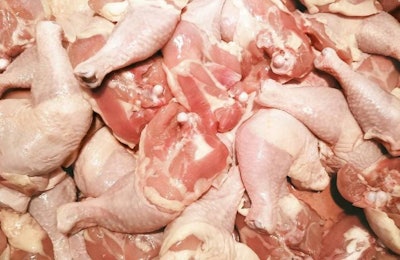
After a break of 12 years, chicken meat exports from Thailand to South Korea have resumed. The first shipment of frozen chicken left a Thai port earlier this week, bound for the South Korean capital, Seoul.
In a twist of fate, it was an outbreak of avian influenza in Thailand that halted the trade in 2004, and the same disease that has put South Korea on the highest state of alert this week. Officials there have ordered the culling of up to 20 percent of the nation’s poultry to reduce the spread of the virus.
According to Nikkei Asian Review, the 15.2-ton poultry meat shipment came from Charoen Pokphand Foods (CPF), following inspections by South Korea officials that resulted in approval of 12 poultry processing plants earlier this year. Plants run by Betagro and Cargill’s Thai poultry division have also been authorized to export chicken to South Korea.
At an event to celebrate the first shipment, Thai Agriculture and Cooperatives Minister, Chatchai Sarikulya, said the resumption of the trade to South Korea will increase Thailand’s poultry trade by 3 percent in 2017, with the total volume expected to reach 40,000 tons.
South Korea is the last major market to resume imports of poultry from Thailand after the avian flu outbreaks in the kingdom in 2004.
South Korea culls 20 percent of poultry as avian flu alert raised
In a rapidly escalating situation, South Korea’s Ministry of Agriculture, Food and Rural Affairs (MAFRA) has today ordered the culling of a further four million poultry, reports Reuters. This is the largest cull to date, bringing the total number of domestic birds destroyed as the result of highly pathogenic avian influenza (HPAI) to 16 million this season, or almost 20 percent of the nation’s poultry population. There have been 54 confirmed outbreaks.
First cases HPAI of the H5N6 subtype were confirmed at a chicken farm in Haenam, 423 kilometers south of Seoul, in mid-November.
Earlier this week, the Ministry raised the country’s watch level for avian flu from “alert” to “serious,” the highest level of vigilance in the country’s disease control system, reports news agency, Yonhap.
MAFRA’s most recent official report to the World Organisation for Animal Health (OIE) is dated December 2. It outlined six new outbreaks of HPAI in poultry, taking the total at the time to 20.
According to Yonhap’s latest report, the H5N6 virus has also been confirmed in a wild swan found dead in in the city of Gyeongsan in North Gyeongsang province in the south-east of the country.
In 2014-15, 14 million poultry were culled in South Korea as the country was hit by widespread HPAI outbreaks caused by the H5N8 virus variant.















